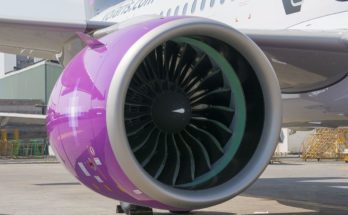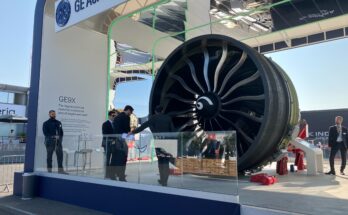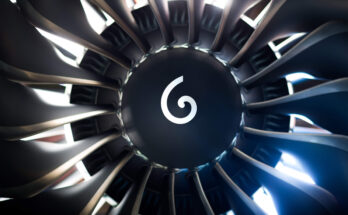
GE Aerospace is preparing for the imminent service entry of its GE9X engine, specifically designed for the Boeing 777X, set to enter service in 2026. Certified in 2020, the GE9X has undergone rigorous testing, accumulating 17,000 hours and 27,000 cycles, including successful dust ingestion tests and ETOPS 3K endurance trials. Production and deliveries have already commenced, with a significant ramp-up anticipated in the latter half of 2025.
The 110,000-pound-thrust engine features 16 fourth-generation composite fan blades, a reduction from earlier models, and is projected to deliver a 10% improvement in fuel efficiency compared to the GE90. The GE9X is the extensive use of ceramic matrix composites (CMCs), a material pioneered by GE Aerospace in aviation. CMCs, with the same density as aluminum, are one-third the weight of the titanium parts they replace and offer superior high-temperature durability.
GE has invested over $1.5 billion in developing this material and establishing its supply chain, including a new plant for silicon carbide fiber production. The GE9X incorporates 107 CMC parts across five components, benefiting from the material’s localized impact damage resistance due to its fiber matrix. To support the GE9X’s entry into service, GE Aerospace has also invested over $1 billion in maintenance, repair, and overhaul (MRO) infrastructure, training, and tools across its global network.
In October 2024, Boeing announced a significant delay in the initial deliveries of its 777X family of commercial airliners, pushing back the 777-9 from 2025 to 2026 and the 777-8F freighter from 2027 to 2028. These postponements were attributed to a strategic focus on resource allocation amidst a challenging industry climate and a strike by the International Association of Machinists and Aerospace Workers (IAM). The 777-9, the lead variant of the 777X series, is currently undergoing flight testing and certification. The 777X family, including the 777-9 and the longer-range 777-8 passenger models, is designed to replace older 777 models like the 777-300ER, with Boeing anticipating a strong market position for the 777-9 in the coming years.
At the end of April, Boeing had recorded 521 orders for the 777X series, with the majority for the 777-9, followed by the 777-8F and 777-8.



